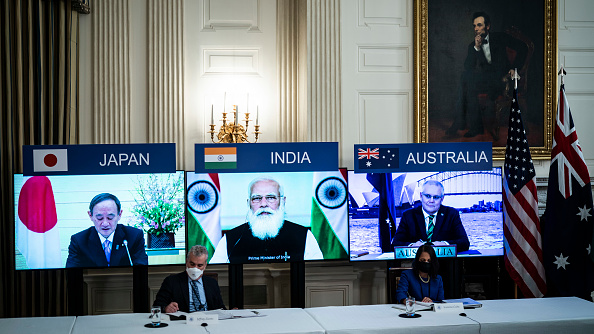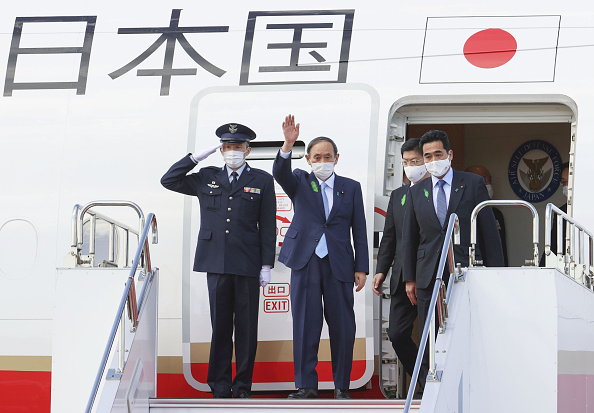
U.S. President Joe Biden meets virtually with Prime Minister Yoshihide Suga of Japan, Prime Minister Narendra Modi of India and Prime Minister Scott Morrison of Australia in the State Dining Room at the White House, Washington, D.C., March 12, 2021. /Getty
U.S. President Joe Biden meets virtually with Prime Minister Yoshihide Suga of Japan, Prime Minister Narendra Modi of India and Prime Minister Scott Morrison of Australia in the State Dining Room at the White House, Washington, D.C., March 12, 2021. /Getty
Editor's note: William Jones is a Washington policy analyst and a non-resident fellow of the Chongyang Institute for Financial Studies, Renmin University of China. The article reflects the author's views and not necessarily those of CGTN.
Prime Minister Yoshihide Suga's visit to Washington as the first world leader to meet personally with the newly elected U.S. president no doubt had its appeal for the new leader of Japan, but uniting the with the U.S. President Biden in his concerted effort to contain China will have its problems. The Joint Statement issued from the meeting reveled in these two major powers joining hands to assure a "free and open Indo-Pacific."
Suga has also indicated that he will be traveling to India and to the Philippines in order to "shore up" support for the Quad agenda, serving as the Biden envoy in his anti-China campaign. What greater support can a new Japanese leader have, than knowing that he is backed up by a major power like the U.S. – until he isn't. It seems as if Japan hasn't learned the lessons of history.
Japan also joined up with a major Western power, Great Britain, in the beginning of the 20th century with the view of becoming the "enforcer" in the Asia-Pacific. That venture showed some success for a time for the ambitious Japanese leaders. Victory in the first Sino-Japanese War in 1895 with territorial gains in Taiwan and, for a time, in the Liaodong Peninsula, until Russia, France and Germany put a stop to it. And then the surprise victory in the Russo-Japanese War of 1904-05, with the Japanese friendly U.S. President Teddy Roosevelt umpiring the peace and awarding Japan with some of the booty for the victor in the Sakhalin Island.
But China was much weaker at that point and Russia was somewhat overextended, having barely completed its Trans-Siberian Railroad. Things are different now. Both China and Russia are major nuclear powers and the shadow of the horrors of World War II in the Pacific theater and the memory of the Japanese war crimes still live on in the memories of the inhabitants of these countries.

Japanese Prime Minister Yoshihide Suga arrives at Tokyo's Haneda airport following a visit to the United States for talks with President Joe Biden, April 18, 2021. /Getty
Japanese Prime Minister Yoshihide Suga arrives at Tokyo's Haneda airport following a visit to the United States for talks with President Joe Biden, April 18, 2021. /Getty
During the post-war period, it seemed as if Japan had learned the lessons of war, with several Japanese administrations establishing close relations with the People's Republic of China, and even providing some assistance and encouragement for Deng Xiaoping's reform and opening up and China's return to the international community. The China-Japan relationship has also profited Japan immensely with access to the biggest national market in the world. Will that be worth the sacrifice of playing patsy to a country which has taken upon itself the task of "making the rules" for the world community?
While the United States is still the major power in the world militarily, if not economically, they are far away from the region. And the American political scene is far from peaceful at the moment. Biden is still tasked with bringing the country out of the worst COVID-19 crisis suffered by any country and faces the daunting task of bringing the country together after a long period of internal chaos. While he is intent on pulling troops out of Afghanistan to bolster the military forces in his Indo-Pacific gambit, it is not at all clear that an eruption there or somewhere else in the world may not require another change of strategy and redeployment of forces to another hot spot. So Japan playing the "enforcer" for the Quad could be a risky business.
And as Japanese warships again patrol the East China and South China Seas as they did in the World War II, those countries that still have the memory of those days China, South Korea as well as the ASEAN countries, will look with trepidation at this new but now totally unknown force patrolling their waters. And China today is no longer suffering from the "hundred years of humiliation" but is a major nuclear power, and if this "containment operation" leads to a military conflict, and it inevitably will if persisted in, Japan will be on the front lines with no line of retreat.
As philosopher George Santayana so famously said, "Those who refuse to learn from history, are doomed to repeat it." If Japan repeats the lessons of history in seeking to play a role as a regional enforcer or "satrap" for an imperial-minded United States, it can only come out on the losing end with more damage than simply to its "good reputation" among the Asia-Pacific countries.
(If you want to contribute and have specific expertise, please contact us at opinions@cgtn.com.)

